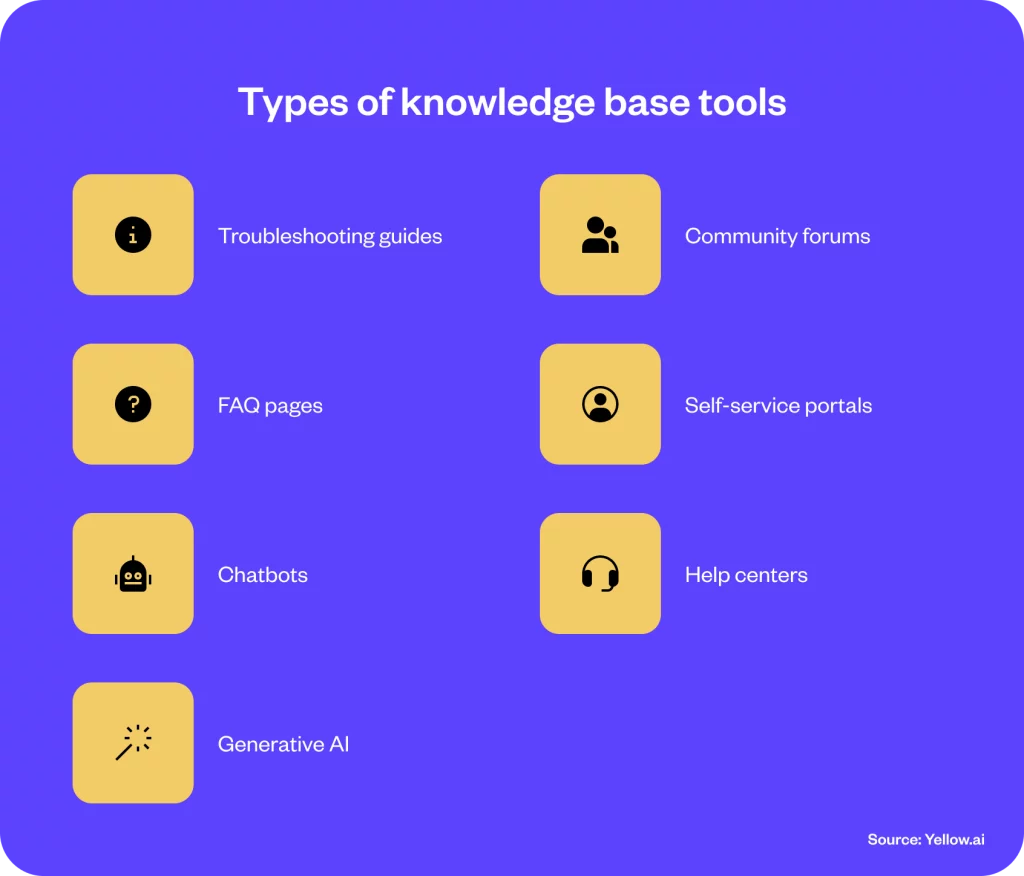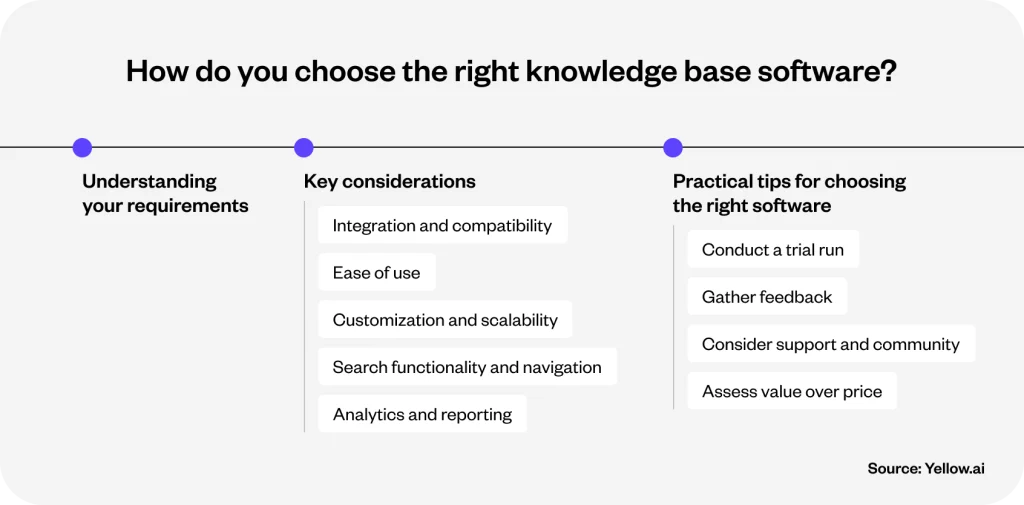Executive summary
Explore the essentials of selecting the perfect knowledge base software with this comprehensive guide. It is crafted to enlighten businesses on the importance of these platforms for enhancing customer self-service and improving team dynamics. From breaking down what knowledge base software encompasses to its varied types, significant benefits, and the selection process, this blog offers all essential insights. It will equip you with the necessary information to choose a knowledge base tool that best suits your business’s unique needs and objectives.
Did you know that 88% of customers expect a brand to offer an online self-service support portal? This statistic from Statista is a clear indication of the shift towards digital-first customer service. Knowledge base software is the unsung hero of customer support and team productivity. It is way more than just answering FAQs. A knowledge base software is about creating a hub where information flows freely, answers are just a search away, and your team can collaborate without barriers.
Choosing the ideal knowledge base software is not merely limited to ticking off features. It is about discovering a solution that seamlessly integrates with your business’s fabric. Think of it as a partner that preemptively addresses customer inquiries and also serves as a knowledge hub for your team. Ultimately, it enhances collaboration and efficiency. In the following sections, we will explain the intricacies of knowledge base software, highlight its key advantages, and guide you through selecting a platform that feels like it was custom-built for your business needs. Read on to transform your approach to customer service and knowledge sharing.
What is knowledge base software?
Knowledge base software stands as a cornerstone for efficient customer service and internal knowledge sharing in this digital-first world. But what exactly is this tool that’s becoming indispensable for businesses aiming to up their service game? At its core, knowledge base software is a specialized platform designed to store, organize, and share information. It is like a digital library that is accessible anytime, filled with articles, FAQs, and guides. This tool makes it easier for customers and employees to find the answers they need without waiting in line for assistance.
For businesses, the appeal of knowledge base software lies in its ability to streamline customer support and enhance self-service options. Imagine a customer browsing your online store for eco-friendly sportswear and wondering about your sustainability practices. Instead of sending an inquiry and waiting for a response, they could quickly access your knowledge base. Doing so will help them find a detailed article on your eco-friendly materials and proceed with their purchase. That is what knowledge base software brings to your business. This self-sufficiency boosts customer satisfaction and also reduces the workload on your support team. It allows your team to focus on more complex queries.
Knowledge base software is not merely about answering external questions. It is a goldmine for internal team empowerment. From onboarding new employees to providing step-by-step procedures for common tasks, it serves as a central hub for collective wisdom. This tool encourages a culture of knowledge sharing and continuous learning within organizations. That makes knowledge base software a key player in driving operational efficiency and developing a collaborative work environment. Ultimately, knowledge base software is a strategic asset that enhances both customer experience and internal workflows. That makes it a wise investment for businesses aiming to stay ahead of the competition.
Types of knowledge base tools
Navigating the vast landscape of knowledge base tools can be a game-changer for businesses looking to elevate customer support and streamline internal operations. Each type of tool serves a unique purpose, addressing different needs within the customer service spectrum. Let’s break down the options, keeping it straightforward and focused on the essentials.

1. Troubleshooting guides
These are your go-to resources for solving common problems. Simple, step-by-step instructions guide users through issues without needing to contact support. Let’s consider an example. For a software company, a troubleshooting guide might mean a guide that helps users troubleshoot installation issues and enable quick fixes without waiting for help.
2. FAQ pages
FAQ pages answer common questions in one spot. They are a time-saver, as they cut down on repetitive inquiries to your support team. For example, an online retailer might include shipping policies and return procedures here. It will give customers quick answers to common questions.
Related read: How to create a FAQ chatbot + examples, types, benefits
3. Chatbots
Chatbots provide instant support, using AI to answer questions anytime. They are like a 24/7 digital assistant for your website, as they guide visitors and offer help. For example, a chatbot can direct users to popular products or help with basic troubleshooting. It can enhance the customer experience without human intervention.
Related read: AI Chatbot – A Complete Guide for [2024]
4. Generative AI
Generative AI creates and updates content automatically. It keeps your knowledge base fresh. Furthermore, Generative AI adapts articles and FAQs as your products evolve. It ensures users always have the latest information. Imagine an AI that updates your help articles every time you release a new feature. That will make manual updates a thing of the past.
Related read: Generative AI – The ultimate guide for 2024
5. Community forums
Forums are where users share tips, solve each other’s problems, and discuss your products. It is a community-driven support channel that enriches your support with real user experiences. For instance, a tech company’s forum could be a place where users swap advice on using gadgets. It can create a valuable resource of user-generated solutions.
6. Self-service portals
These portals let users find information, solve problems, and manage their accounts on their own. It is all about empowering your customers to help themselves. For instance, a telecom company might offer a portal for bill payments and service troubleshooting. It can streamline the customer experience.
7. Help centers
Help centers are the comprehensive library of your support content, from articles to video tutorials. They are organized for easy navigation. Moreover, they let users find exactly what they need. For example, a cloud services provider might use a help center to house setup guides and security tips. It gives customers a one-stop shop for support.
Why do you need a knowledge base system?
Today’s world is a fast-paced digital environment. Here, information is more than just a resource; it’s the currency of customer satisfaction and operational excellence. That makes a knowledge base system beneficial and essential for businesses aiming to thrive. Here’s why:

1. Self-service customer support
Businesses often grapple with the challenge of balancing high-quality customer support with the reality of finite resources. The knowledge base system offers a digital solution to empower customers to help themselves. By providing a comprehensive repository of answers to frequently asked questions, how-to guides, and troubleshooting instructions, a knowledge base system significantly reduces the volume of support tickets. This shift frees up your support team to tackle more complex queries. Furthermore, it also caters to the modern customer’s preference for quick, self-directed problem-solving.
For instance, a customer encountering a minor software issue could find a step-by-step troubleshooting guide in your knowledge base. It will help them resolve the issue on their own and come away with a positive view of your brand’s support infrastructure.
Tips for businesses
- Regularly update your knowledge base with new information and answers to recently asked questions.
- Use clear, concise language and include visuals to enhance understanding.
- Implement a feedback system to improve the resources based on user interaction continuously.
2. Team collaboration and knowledge-sharing
The second pivotal area is internal operations. A knowledge base is not merely an external tool for customers. It is a powerhouse for internal team collaboration and knowledge-sharing. It acts as a centralized platform where employees can access necessary information, share insights, and learn from each other’s experiences. This collective intelligence establishes a culture of knowledge-sharing, reduces repetitive inquiries among team members, and streamlines onboarding processes.
Imagine a scenario where new hires can independently navigate through a well-structured internal knowledge base to understand company policies, project workflows, and product details. That will accelerate their acclimatization and productivity.
Tips for businesses
- Encourage employees to contribute their expertise to the knowledge base.
- Organize content into easily navigable categories.
- Regularly review and update content to keep it relevant and accurate.
3. Employee productivity
A knowledge base system directly impacts employee productivity by minimizing time spent searching for information. When employees have immediate access to a well-organized repository of company knowledge, they spend less time inquiring and more time performing their core responsibilities. This efficiency accelerates task completion and enhances job satisfaction. Moreover, it reduces the frustration associated with information bottlenecks.
Tips for businesses
- Ensure the search functionality is robust and intuitive.
- Promote the use of the knowledge base for on-the-job learning and problem-solving.
- Monitor usage patterns to identify areas for improvement and expansion.
4. Customer retention
Customer retention depends on your business’s quality of support and the autonomy to find solutions. A knowledge base system enhances both by providing round-the-clock access to problem-solving resources. This empowerment leads to increased customer satisfaction, loyalty, and the likelihood of repeat business.
When customers know they can easily find answers to their questions, their trust in your brand grows. Subsequently, they are more likely to become advocates for your products or services.
Tips for businesses
- Highlight the most valuable and frequently sought-after information.
- Optimize content for SEO to ensure customers can find solutions via search engines.
- Regularly solicit customer feedback to identify gaps in your knowledge base and opportunities to add value.
How do you choose the right knowledge base software?
Choosing the right knowledge base software for your business comes down to understanding what you need and making sure the software fits those needs perfectly. Here’s a straightforward way to think about it:

Understanding your requirements
Before diving into the sea of available knowledge base software, start by defining what you need. Consider whether you are aiming for an external customer-facing solution, an internal repository for your team, or both. Evaluate the volume of content you plan to manage and the level of customization you will need to match your brand’s aesthetic.
Key considerations
1. Integration and compatibility: Ensure the knowledge base software seamlessly integrates with your existing tools and systems. It should complement your customer service software, CRM, and any other platforms your team uses daily. This integration enhances efficiency and allows for a smoother flow of information across different channels.
2. Ease of use: Both your team and your customers will interact with the knowledge base, so its usability is paramount. Look for intuitive interfaces that require minimal training. Test the software’s user experience from both an editor’s and an end-user’s perspective to ensure it’s straightforward and accessible.
3. Customization and scalability: Your chosen solution should not only reflect your brand’s look and feel but also grow with your business. Assess the software’s customization options and its ability to scale. As your business evolves, your knowledge base should adapt. It should accommodate more users, content, and increasingly complex needs.
4. Search functionality and navigation: A powerful search engine within your knowledge base is crucial for users to find answers quickly. The best knowledge base tools offer advanced search features, including auto-suggestions and tagging, to streamline the search process. Effective navigation and categorization further enhance the user experience. That makes information discovery effortless.
5. Analytics and reporting: Insights into how your knowledge base is being used can inform improvements and highlight gaps in your content. Opt for software that provides comprehensive analytics on page views, search terms, and user feedback. This data is invaluable for optimizing your knowledge base and ensuring it fully serves its purpose.
Practical tips for choosing the right software
- Conduct a trial run: Before committing, take advantage of free trials or demos offered by the software providers. This hands-on experience will give you a clearer picture of the software’s capabilities and limitations.
- Gather feedback: If possible, involve a diverse group from your team in the evaluation process. Different perspectives can highlight varied needs and potential issues that you might not have considered.
- Consider support and community: Look into the level of support offered by the provider. Additionally, a vibrant user community can be an excellent resource for tips, best practices, and additional support.
- Assess value over price: While budget considerations are important, assess the value the software brings to your business. A slightly higher-priced option that significantly improves customer satisfaction and team efficiency may offer a better return on investment in the long run.
17 Best knowledge base software (2024)
Knowledge base software is pivotal for enhancing customer support and internal knowledge sharing. The best solutions can transform how businesses manage and disseminate information.

Let’s explore the top 17 knowledge base software that you can choose from.
1. Yellow.ai
In the realm of digital transformation, Yellow.ai emerges as a beacon for businesses seeking to revolutionize their knowledge base systems. Beyond mere tools, Yellow.ai represents a comprehensive solution designed to seamlessly integrate into your organization’s fabric, enhancing customer self-service and team productivity through cutting-edge technology.
- Advanced Natural Language Processing (NLP): Yellow.ai’s NLP technology goes beyond basic interactions, understanding, and interpreting user queries with remarkable accuracy. It ensures users find exactly what they need, reducing frustration and elevating the self-service experience.
- Intuitive No-code platform: With Yellow.ai, creating and updating your knowledge base is a breeze, thanks to its no-code interface. It democratizes the process, allowing team members across your organization to contribute without the need for technical expertise.
- Multilingual support: Break language barriers with Yellow.ai’s multilingual capabilities, offering global customers the convenience of accessing information in their preferred language, thus expanding your reach and inclusivity.
- Seamless integration: Yellow.ai fits perfectly into your existing ecosystem, offering robust integration with CRM, ticketing systems, knowledge bases and other essential business tools, creating a unified platform for all customer interactions.
- Data-driven insights: Leverage the power of analytics with Yellow.ai to gain insights into user behavior and knowledge base performance, enabling continuous improvement and content optimization.
- Automation and live chat: Combine the efficiency of AI with the personal touch of live support. Yellow.ai provides instant answers to common questions, while the option for live chat ensures complex queries are handled with a human touch.
Success stories

Indigo boosts customer satisfaction
Learn how Indigo boosts customer satisfaction to 87% with AI automation

Hyundai boosts revenue and improves customer service with AI automation
Explore how Yellow.ai’s automation led to ~1000 car sales, a 10% retail conversion rate, and over 1.4 million user impressions

Pelago reimagines customer experience with generative AI powered conversational AI agents
Within a mere six weeks of going live, Pelago not only onboarded over 5,000 users but also achieved a striking 50% deflection rate!
2. Zendesk
Zendesk simplifies knowledge management, offering customizable solutions for FAQ tools and internal knowledge bases, enhancing self-service and agent efficiency.
3. Helpjuice
Focuses on collaboration and design, allowing extensive customization and innovative content display options to match your brand and user needs.
4. Freshdesk
A cloud-based solution integrating knowledge base and ticketing systems to boost agent productivity and improve customer experiences.
5. Help Scout
It provides Docs, an easy-to-use platform for creating knowledge-based articles, complemented by AI features for content optimization and translation.
6. Zoho Desk
Offers a comprehensive knowledge base solution with flexibility in customization, catering to both internal teams and external customers.
7. Bloomfire
Centralizes company knowledge, featuring AI-powered search and social media-like interactions to foster a community-driven support system.
8. Guru
Unifies verified information with existing workflows, enhanced by AI to improve suggestions based on user interactions and organizational patterns.
9. Document360
Specializes in creating self-service knowledge bases with features like real-time search, version control, and a markdown editor.
10. Notion
Offers flexibility for creating internal knowledge bases, with a broad range of customization options but a steeper learning curve.
11. HappyFox
A CRM solution with knowledge management capabilities, offering powerful features at a premium price without a free trial option.
12. Confluence
Atlassian’s solution for collaborative team workspaces, ideal for teams using Jira, focuses on internal knowledge sharing and project management.
13. HubSpot Service Hub
Integrates a knowledge base tool into its customer service platform, allowing the creation of a searchable library for better customer support.
14. Nuclino
Offers an internal knowledge base software for centralized information sharing, emphasizing real-time collaboration and documentation.
15. ProProfs Knowledge Base
It empowers teams with online documentation software for easy content management, knowledge sharing, and internal collaboration.
16. ServiceNow
It provides a scalable platform for building knowledge bases and supporting article creation and management with integration capabilities.
17. Slite
A modern document management platform that emphasizes simplicity and organization. Slite excels in team knowledge management, offering hierarchical views, effortless organization, and efficient search capabilities.
The final thoughts on knowledge base
As we navigate the intricacies of modern business landscapes, the role of a comprehensive knowledge base becomes unmistakably central. It’s not just about archiving information; it’s about empowering every stakeholder with the right knowledge at the right time. The evolution from mere FAQs to dynamic, AI-driven platforms marks a leap towards more engaged, informed, and satisfied users and teams. The journey through various knowledge base tools and practices outlined in this guide is a blueprint for building a more resilient, agile, and knowledgeable business ecosystem.
Embracing a suitable knowledge base software is a strategic commitment to continuous learning and improvement. The choice you make today will shape the efficiency of your operations, the satisfaction of your customers, and the collaborative spirit of your team tomorrow. As we wrap up, remember: the right knowledge base solution is out there, ready to align with your unique challenges and aspirations. It’s your turn to take this knowledge and turn it into action, setting a new standard for excellence in your domain.
Frequently asked questions (FAQs)
What is knowledge base software?
Knowledge base software is a specialized tool that businesses use to organize and share information with customers and within their teams. It’s essentially a digital library that contains helpful resources like FAQs, tutorials, and guides, making it easier for users to find the answers they need quickly.
Why is knowledge base software important for businesses?
Knowledge base software is vital because it streamlines customer support by allowing users to solve problems on their own, reducing the demand for support staff. For internal use, it boosts efficiency by centralizing company knowledge, which facilitates easier access and sharing among team members.
What are the key features to look for in knowledge base software?
Look for user-friendly design, powerful search capabilities, customization to match your brand, easy content management, multilingual support, integrations with other business tools, and analytics to track usage and effectiveness.
Can knowledge base software help with SEO?
Yes, knowledge base software can significantly aid SEO efforts. Since it hosts a wealth of searchable, valuable content, it improves your site’s visibility on search engines, driving organic traffic and establishing your authority in your industry.
How to implement knowledge base software effectively?
Define your goals and user needs first. Organize your content clearly, ensure it integrates well with your existing systems, involve your team in its upkeep, and use feedback to refine and improve it continually.
Can knowledge base software integrate with other tools and platforms?
Most definitely. Modern knowledge base systems are designed to work seamlessly with a range of other software, such as CRM and ticketing systems, enhancing overall efficiency and providing a more unified user experience.
What are the best practices for maintaining a knowledge base?
Keep your content up to date and accurate, encourage contributions from across your team, optimize your articles for search engines, monitor user interactions for insights, and regularly seek feedback to identify areas for improvement.























